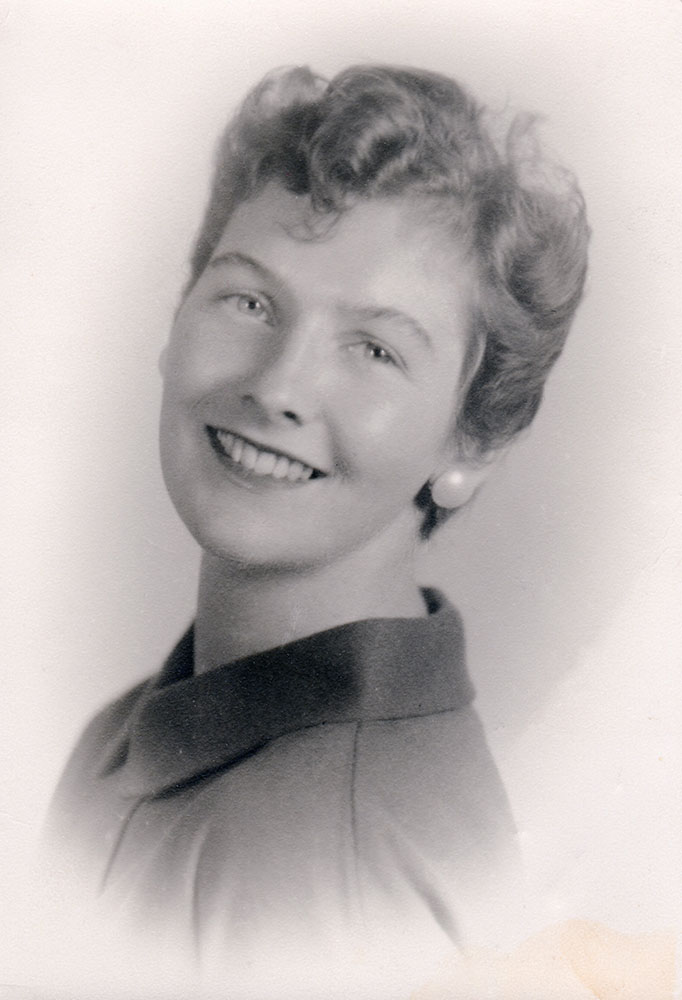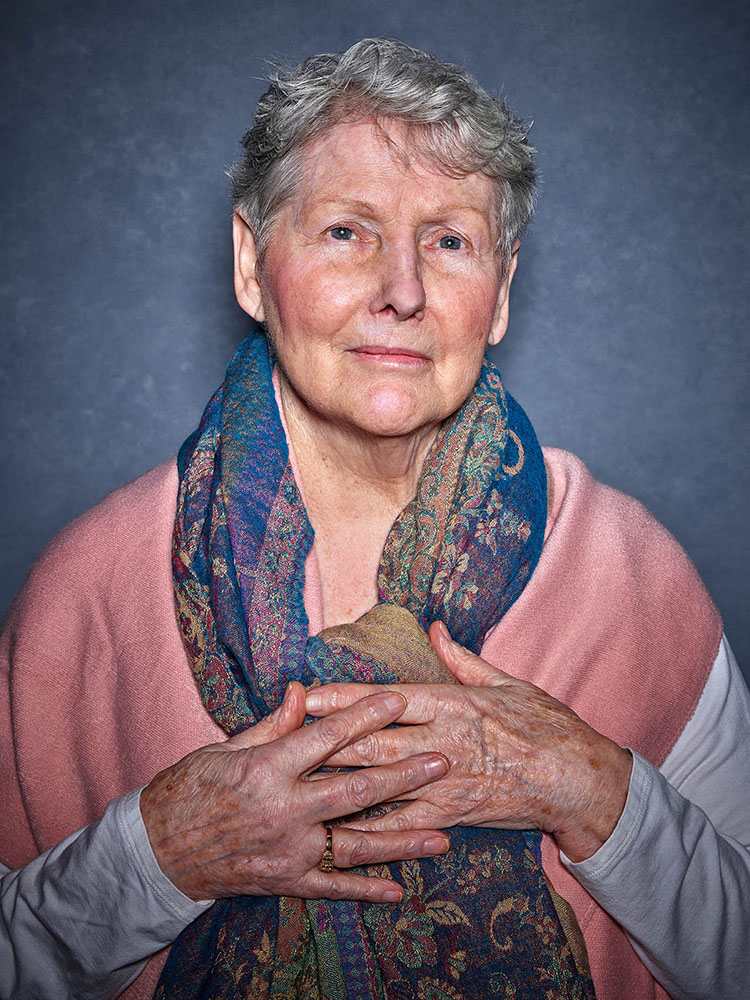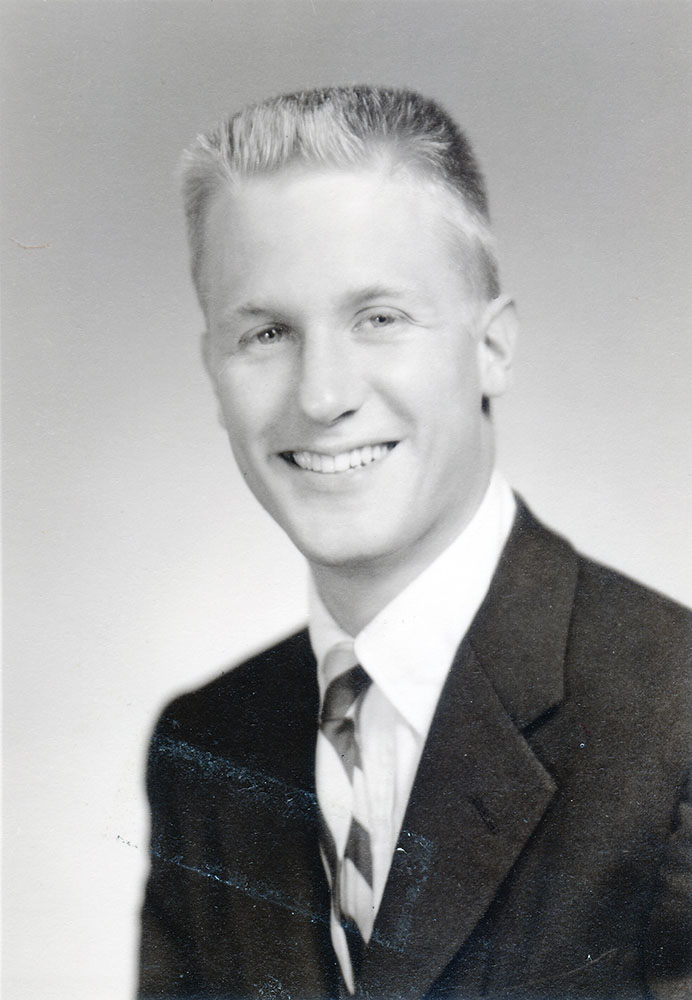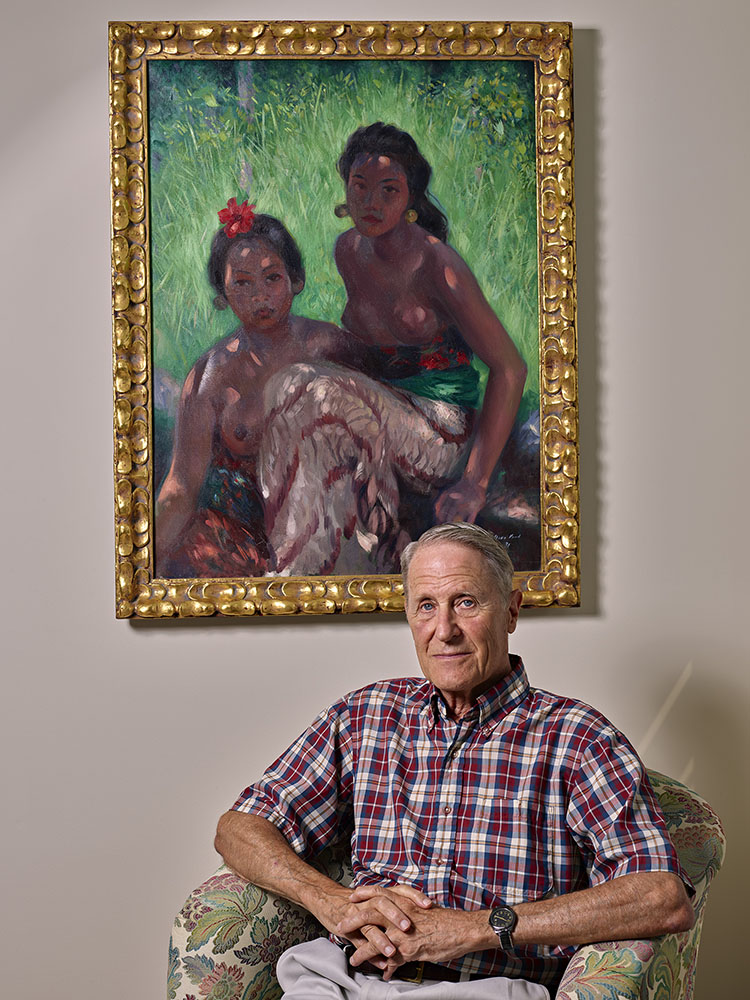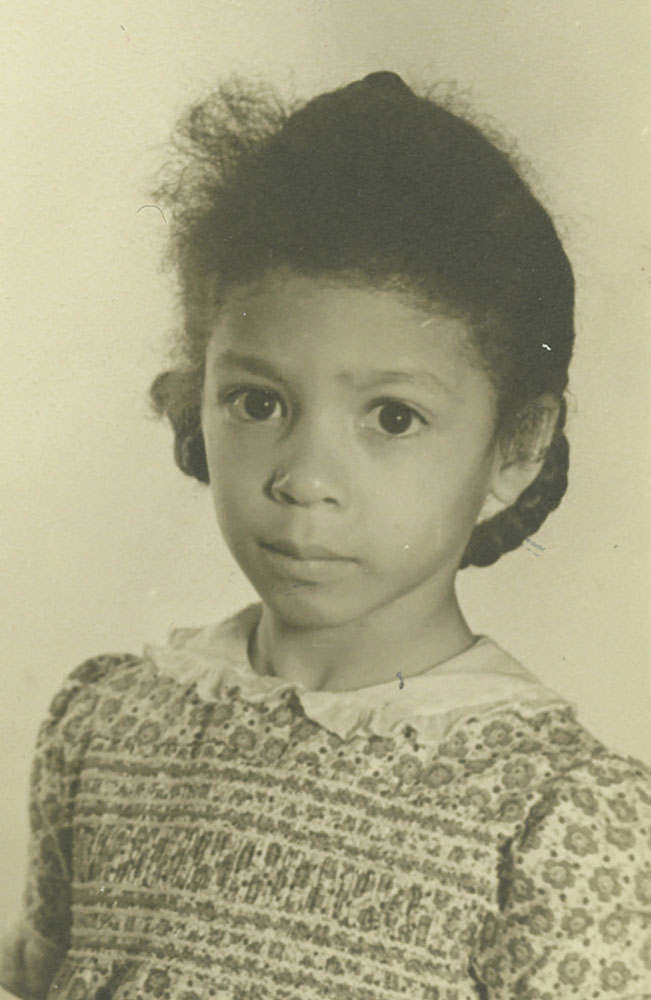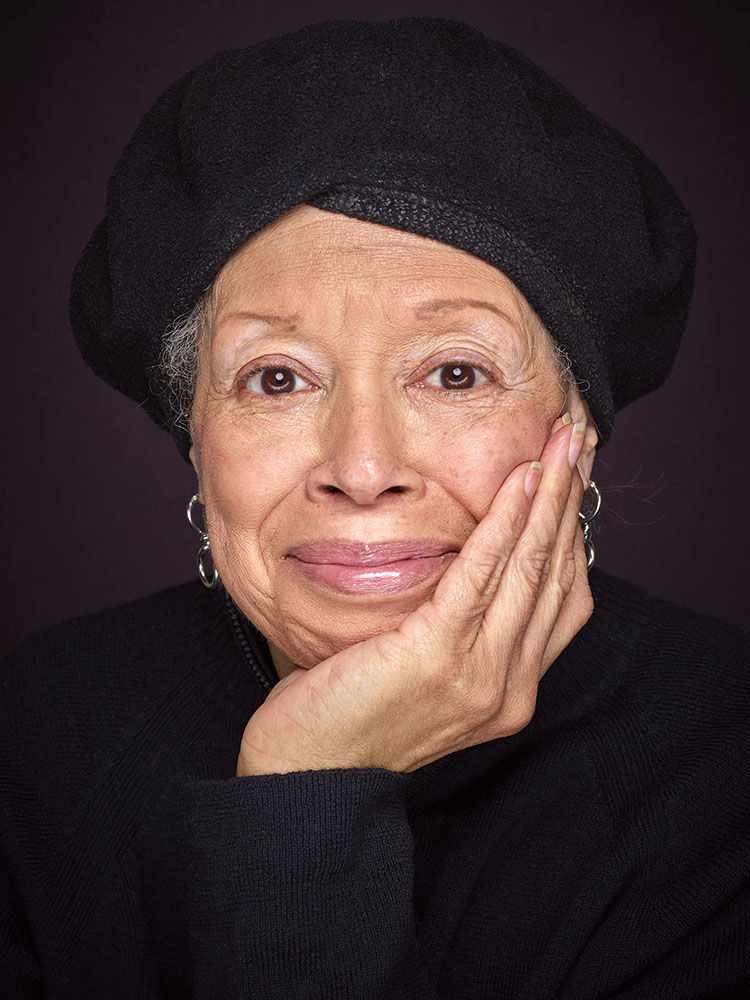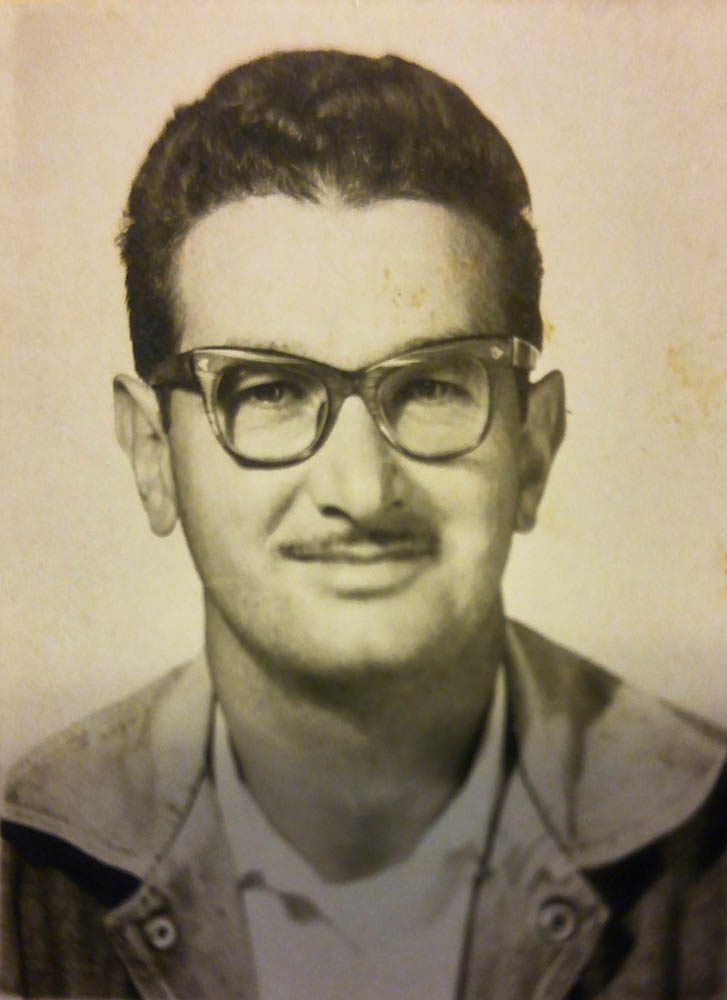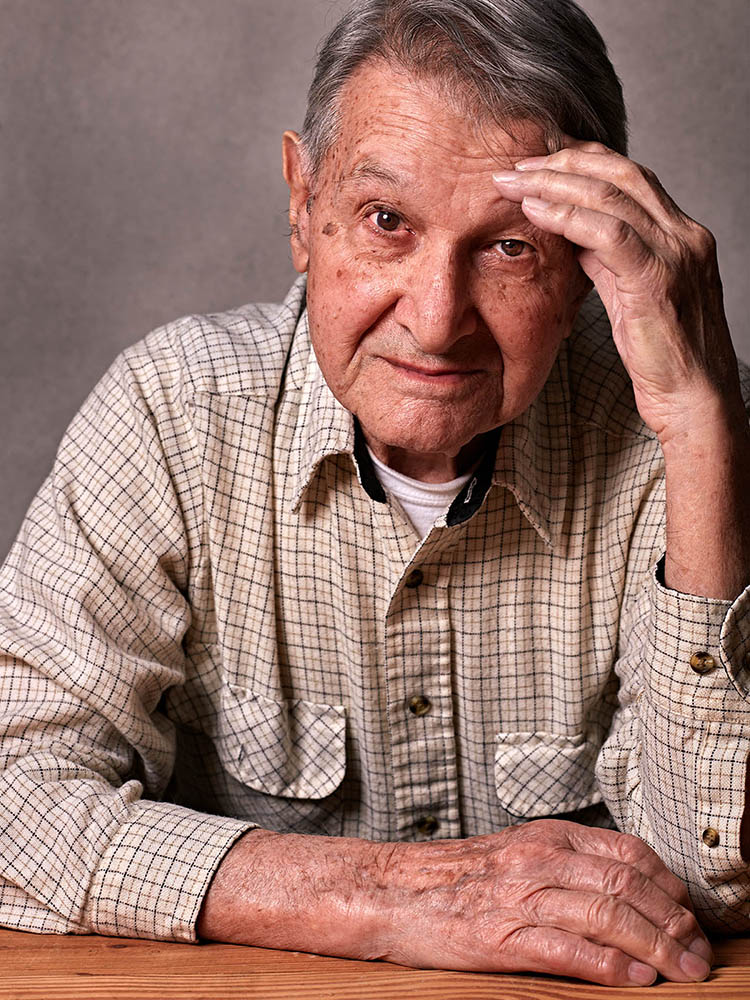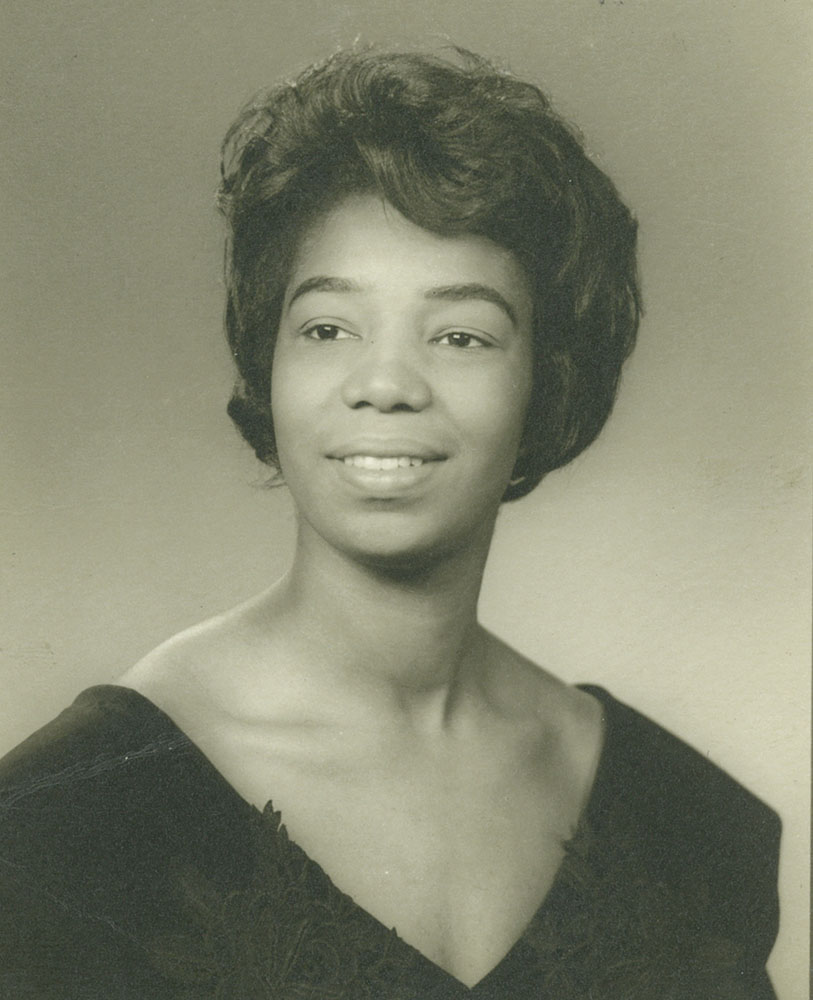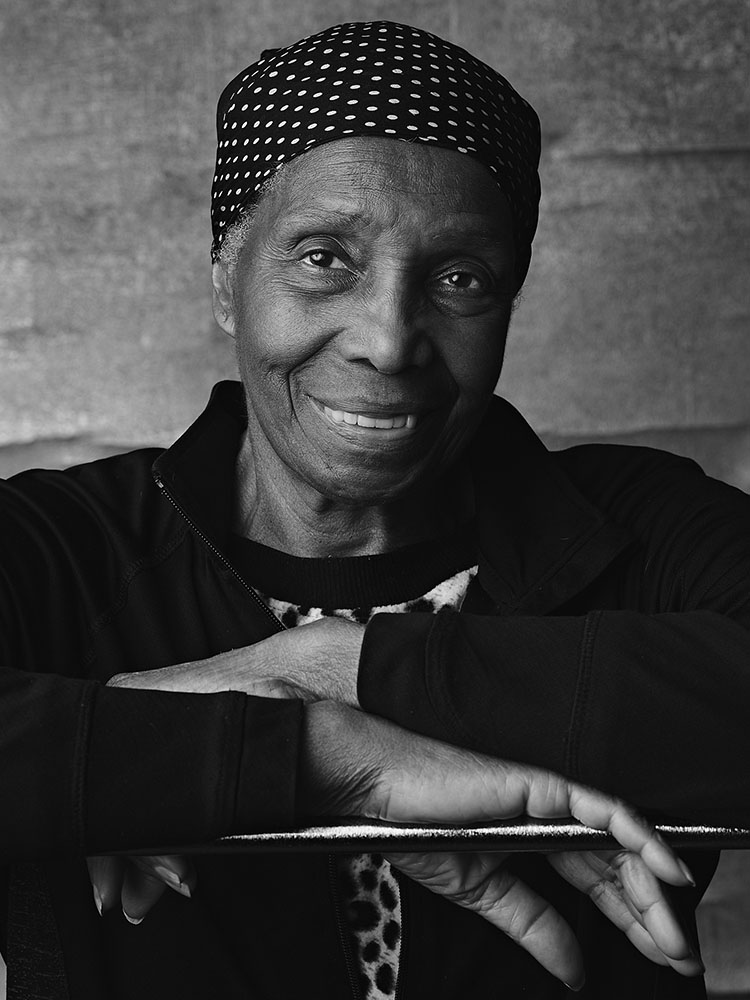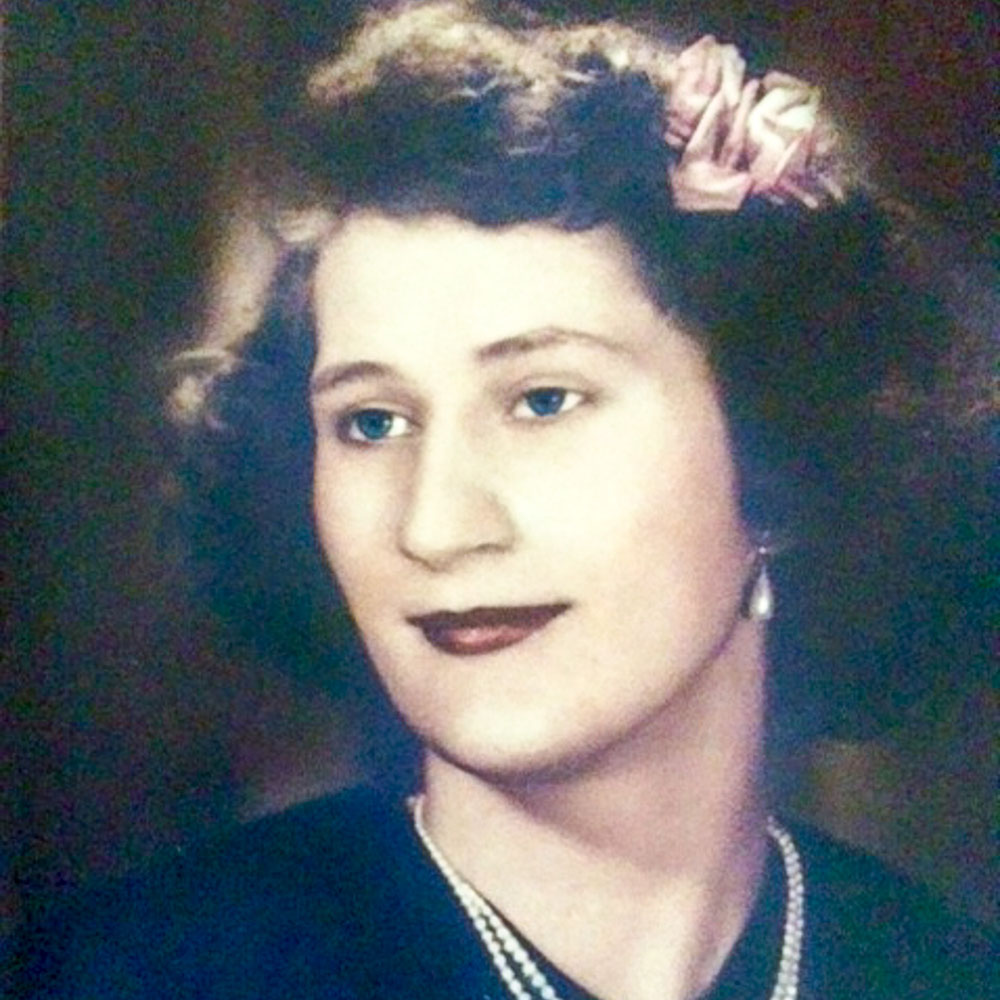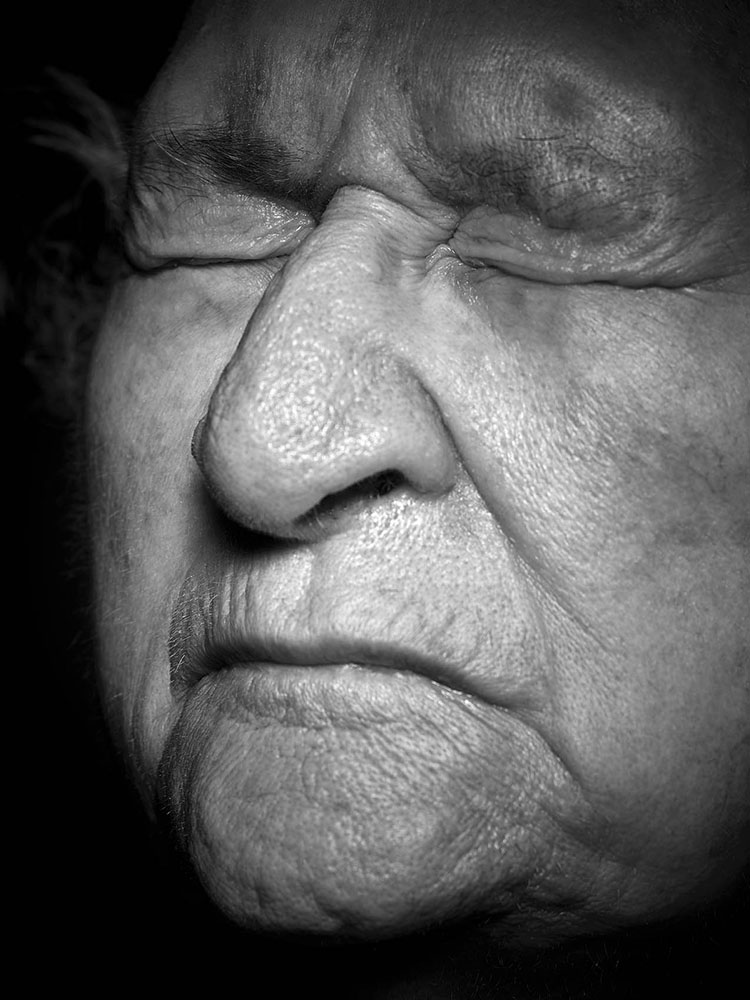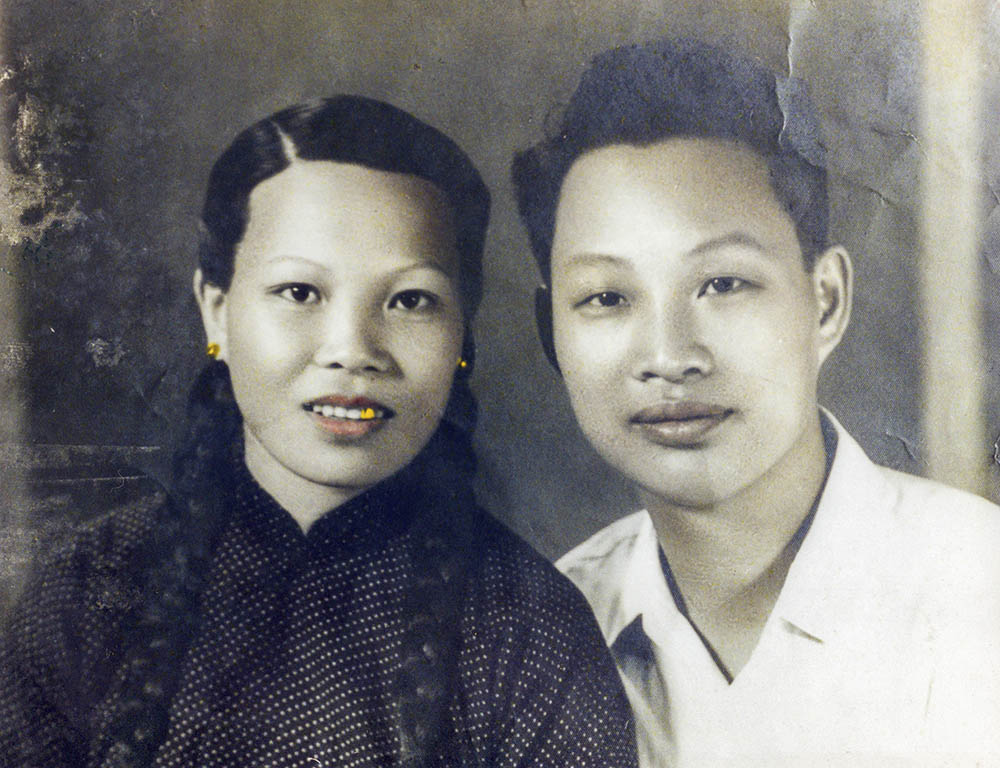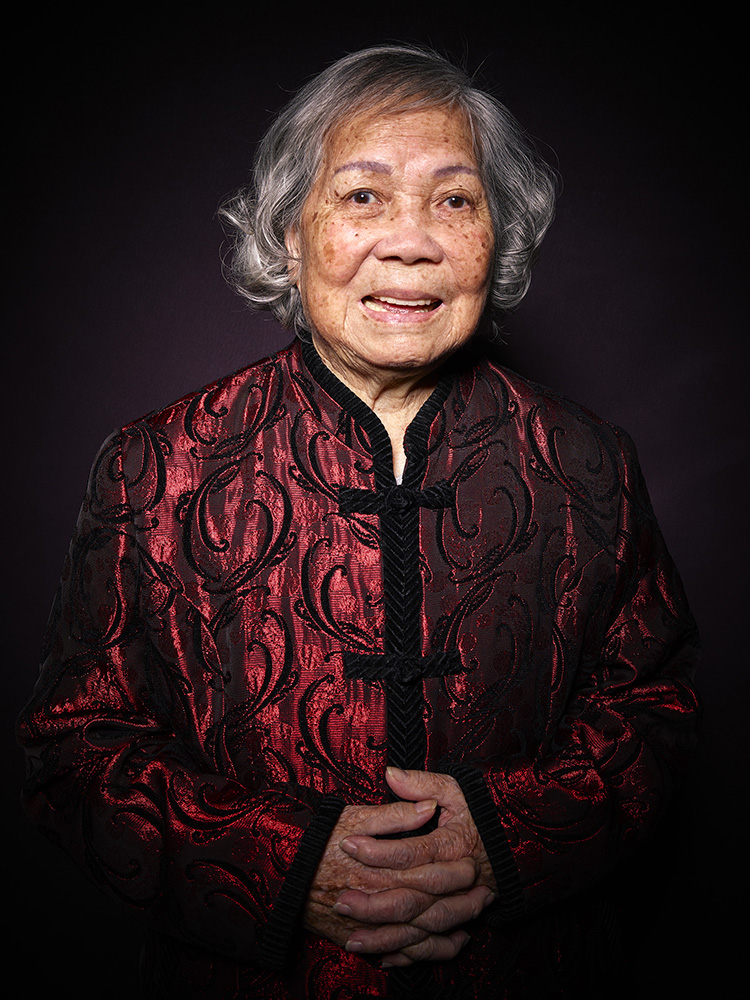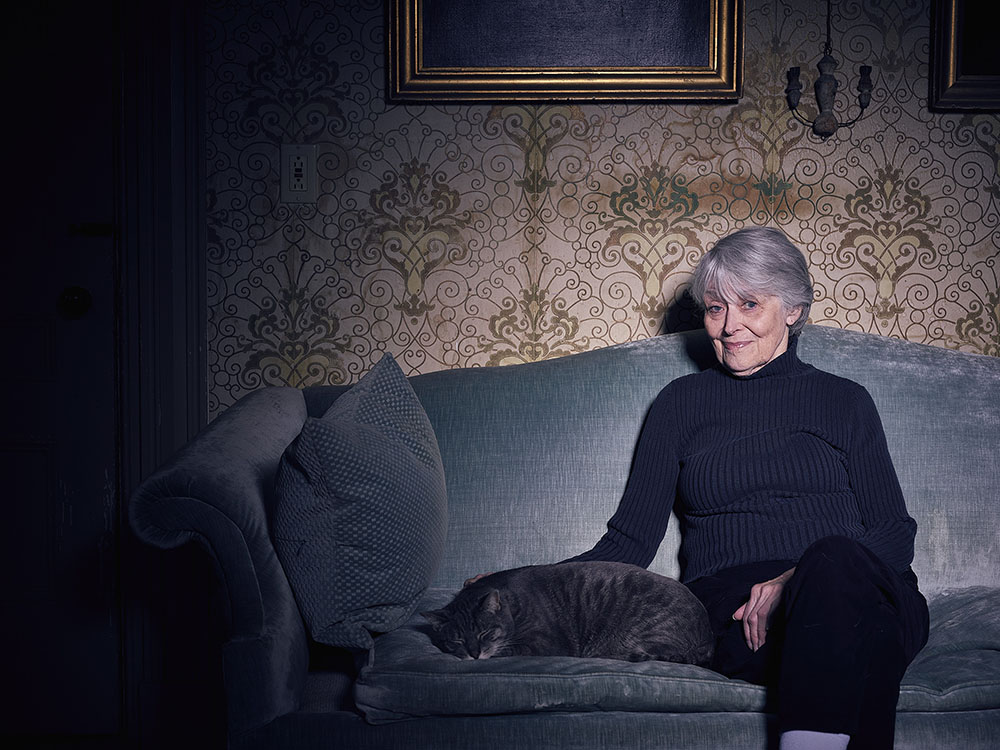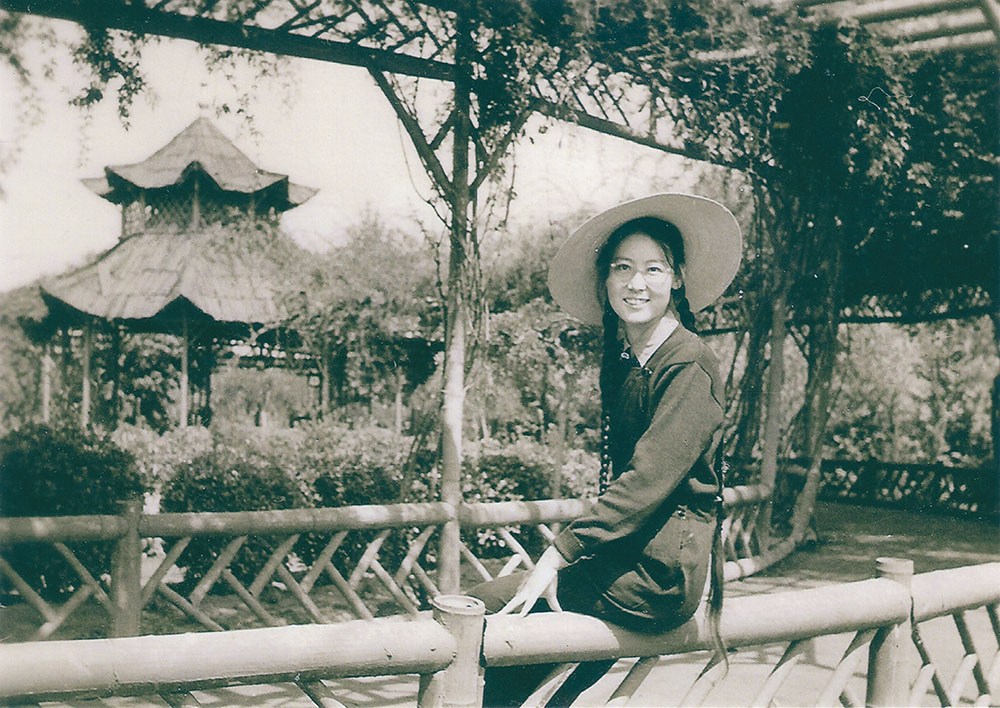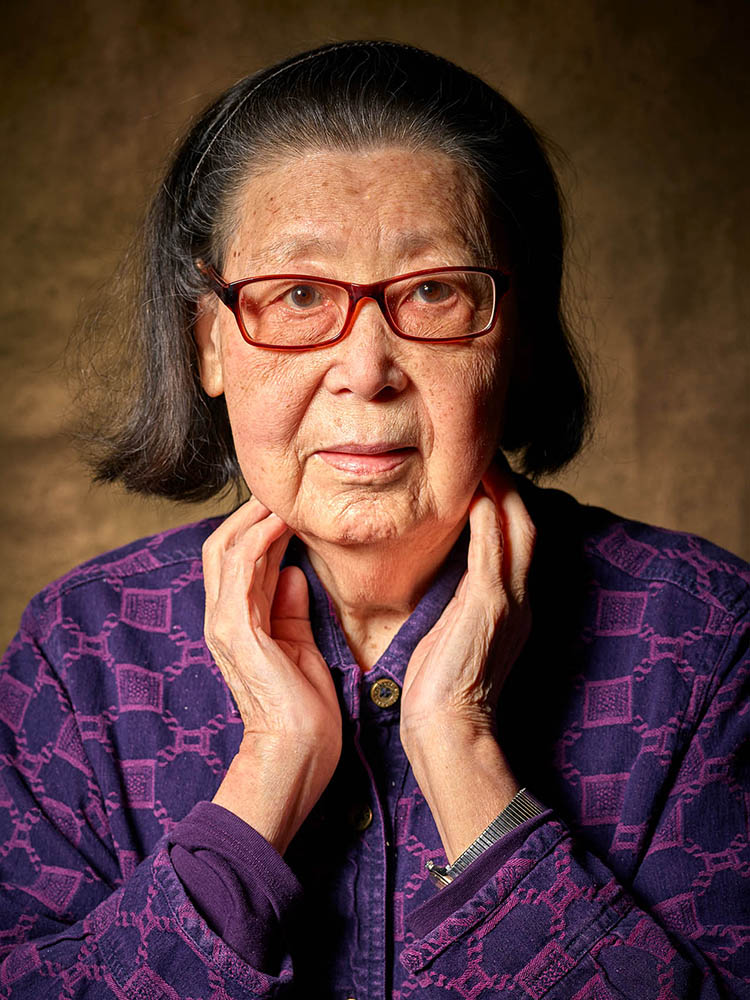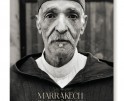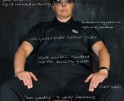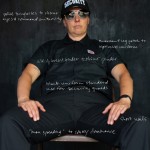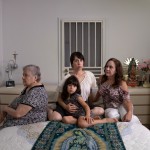Joe Wallace: Beginning at the End: Portraits of Dementia
AINE WALSH
Aine Walsh was born in 1935 in Moycullen, Ireland. Growing up on a farm with 15 siblings, Aine dreamed of moving to America one day. Farm life didn’t suit her and she moved to Galway as soon as she was able. Eventually Aine was able to follow some of her sisters to America and moved in with the eldest in the Jamaica Plain neighborhood of Boston.
Feeling pressure to Americanize, Aine changed her name to Anne and swore off dating Irish men. Despite her original objections, Anne met and fell in love with Edmund, a man from her small hometown thousands of miles away in Ireland. In 1962, the two strangers from Moycullen married and made their start in Lowell, Massachusetts. Anne and Edmund raised four children there and eventually retired to Cape Cod.
She loved to exercise, walk by the ocean and shop. Anne famously took great care of herself, always dressing to impress. This passion was passed on to her youngest daughter Julie who now runs a women’s clothing store named after her mother – Aine’s Boutique. As Julie explained to me – in Gaelic, Aine means radiance and beauty. I don’t know any Gaelic, but after meeting Aine and her three daughters, I can’t think of a more fitting name. Aine met me with her easy smile and penetrating blue eyes. We sized each other up and she made me feel welcome from the start.
Unfortunately Alzheimer’s is a family story – five of Aine’s sisters also have the disease. Staring down this family history, Aine’s daughters are courageously and publicly building awareness of Alzheimer’s and raising funds to help find better treatments and hopefully a cure.
I had the pleasure of meeting Joe Wallace and his work at the Photolucida Portfolio Reviews this past spring. The project he presented, Beginning at the End: Portraits of Dementia, was a thoughtful and compelling look at the faces and lives that have been diminished by Alzheimers disease. Many of the portraits don’t reveal the disease, still it is important to consider these portraits with sympathy and compassion.
Joe states about his project:
In 2019, 50 million people are living with dementia globally. In the United States, one in three seniors suffers with Alzheimer’s or dementia at the time of their death. And yet despite the millions of individuals and families affected, dementia is often a taboo subject with limited public awareness or discourse. A diagnosis can become a mechanism for segregating those affected from society, making it easy to see only the label instead of the individuals. Dementia however does not discriminate. These portraits reflect a cross-section of races and ethnicities affected.
Subjects were photographed and interviewed individually or with a caregiver. Each portrait is paired with a second photograph from the subject’s youth and is presented with anecdotes or stories from the interview to use empathy as a means for connection and understanding and challenge the audience to truly see the subjects, not just their diagnosis.
BILL ZECKHAUSEN
Bill Zeckhausen is an 83 year-old pastoral minister and psychotherapist. He was first ordained as a minister and then became a therapist, working with individuals, couples and physicians. He has dedicated his entire life to helping others.
About five years ago he started forgetting appointments and having some difficulty with life’s routine tasks. Bill admits he was terrified and lived in fear for more than a year until cognitive tests confirmed his worst nightmare: he has Alzheimer’s disease.
Bill worried that if he could no longer do his counseling work, he would have no contribution to make and his life would become meaningless. He became depressed and struggled with suicidal thoughts. Bill decided to tell his son and daughter about his desire and intention to end his life. Their loving and supportive response changed the course of his depression and his plan for how to live Alzheimer’s.
His son told Bill that he understood his sadness and would support whatever decision he made. His daughter said the same and insisted on being with him for the suicide. Overwhelmed by their love and support, Bill decided to seek help from another therapist. During those visits, Bill was reminded of his years of experience helping others with depression. He became convinced that he could still contribute and live a meaningful life – just not in the way he’d originally imagined.
Bill recognized that his fear of the disease and his self-imposed isolation for fear of telling anyone, had amplified his anxiety and depression. To remedy this for himself and to help others, Bill “came out” with his Alzheimer’s diagnosis publicly. He told his extended family, his work colleagues and his congregation. He went on to write letters about living with Alzheimer’s to his local newspapers and lead discussions and Alzheimer’s support groups. This summer he gave a presentation with his wife of 61 years, Barbara, about how to live with, and care for someone with the disease.
Barbara told me “We live each day. It won’t get better than today and we try to find something interesting to do each day. It’s a wonderful trip down memory lane and that’s where all the best memories are at this time. We are grieving the loss of memories together,” she said. “We are grieving what is to come.”
BJ FOX
The warm engaging smile. At once penetrating, and somehow hopeful. That’s the first thing that drew me to BJ when I met her. Oftentimes my subjects are quite nervous at the beginning of an interview. BJ was the opposite. She perceived that I might be nervous or reluctant to ask certain questions and tried to put me at ease. She told me, “I talk a lot. I love people. You can ask me anything.” She treated me like an old friend, certain that we would have a lovely conversation.
Known to everyone as BJ, Barbara-Jean Fox was born May 29, 1940 in Roxbury, MA. Her parents both grew up in Boston and BJ was one of three children. Her parents were active in the community and hosted meetings for a Dorchester women’s group. BJ recalled that one night two members came to the house and asked her parents to take in a little girl whose mother had died. They agreed on the spot. Later, in similar circumstances, her parents adopted a boy whose mother had died in childbirth.
BJ told me, “My parents adopted two children and I was home with them most of the time. I was like 16 or 17. By that time my brother was in the service. My sister was getting married. I never got married so I took care of the kids and helped my mother with them.” I remarked to BJ that her parents had set a powerful example of love, selflessness and compassion. She slowly nodded her head. Eyes glistening with tears, she said, “I love children. I was already really good with them. I get that from my mother and grandmother.”
BJ regaled me with stories of babysitting her adopted brother and sister and how she loved working with children. But when I asked her about her work life, she couldn’t recall the 25 years she worked at New England Telephone. Only with a friend’s prompting, did she tell me about assembling the phone books each year. BJ remembers her birthday but not her age. When we were talking, her mind would get stuck and she would repeat the same story every few minutes. BJ described losing her brother last year after a battle with Lewy body dementia. But when I asked her if she was afraid of dementia she simply shrugged and said, “I have wonderful friends, I don’t need to worry. They will help me.”
EDWIN BARTLETT
Edwin Bartlett is part of a large, close-knit family. One of eight children, he was born in the summer of 1929 in Quetzaltenango, Guatemala. The siblings were very close growing up and stayed in touch even as some left home – Edwin moved to New England and others moved to California.
I asked his daughter Claudia what Edwin loved most about his life and she said, “He loved his late wife of 64 years and his children. Living a good, useful life and providing for his family. He taught us to treat all people equally no matter who they are or where they are from. Be true to yourself. Be helpful to others when needed. He would say that life is short – don’t waste time and energy on ignorant racists or mean people.”
Edwin and I met at La Alianza Hispana – an adult day care that caters to Latino immigrant elders. It’s offers Edwin the opportunity to socialize and receive care, enabling his daughter to go to work knowing he’s safe and well cared for.
Edwin was gracious and patient as I fumbled to use my high-school Spanish. I learned that he was great with his hands and could repair or build just about anything. Edwin dreamed of becoming a mechanical engineer but had to give up college and go to work to help support his family instead.
I asked Claudia what values her dad taught her and she said, “Family is the most important thing. Being supportive of each other. Getting a proper education, being responsible and honest. Follow thru on the promises you make.”
As we ended our conversation, Edwin looked sad and I asked him, “what’s wrong?” He looked at me and replied, “I just want it to be like it was before.”
JUANITA PETERSON
Juanita Peterson gave me a firm handshake and warm greeting. She listened patiently as I explained this project and gave a little background about myself and my family’s history with dementia. She agreed to let me take her portrait and tell her story because she adamantly wanted to help others with dementia if she could. But she asked me to come back another day because she didn’t like her appearance today. I gently explained that we had a similar conversation two weeks earlier and that today was the day she had chosen for me to come back. Juanita quietly sighed, nodded her head, and said, “Ok. I’m ready then.”
Juanita described that she was born in 1939, one of seven children, and grew up in Winston Salem, NC. After graduating high school, she moved in with an older sister in New York City to attend City College. During that time, she met her future husband, Alonso (Al), who was from Tuskegee, AL and a NYC police officer. She continued her studies at New York University, earning a PhD in clinical psychology. For 28 years she worked with adolescents and adults at Bellevue Hospital. After retiring, Juanita and Al moved to Chesapeake, Virginia.
When I asked Juanita how she came to Boston she replied, “I’m still trying to recapture information but it just blocks out. I don’t have details on what happened to me. All I know is that one day I woke up in my daughter’s house. And that was weird. I’ve been trying to recapture what happened . . . it’s a total blackout. I don’t remember being ill. I just remember waking up in my daughter’s house. I don’t even remember being in the hospital.“
I asked Juanita about her dementia and how it feels to not remember, and she replied, “It feels awful. Let me tell you. It feels like a part of my life is cut off and I can’t get it back. I really feel sad. The other day I couldn’t remember my husband’s birthday. How could I forget that!? It’s frightening that you could not remember things that were so important to you.”
Later, Juanita’s daughter Lisa explained that Al was diagnosed with Lewy body dementia in 2015 and passed away in 2017. Juanita was diagnosed with dementia in 2016 and her memory decline accelerated after Al’s death. In 2018, Juanita was hospitalized with a bowel obstruction and Lisa decided it was no longer safe for Juanita to live in Virgina and moved her mother into her home in Boston. Lisa told me, “She misses Al. He was her rock. I think she finds living with me demoralizing and humiliating. She was so independent and used to making her own decisions. It’s definitely shifted the family dynamics. Everyone has learned to be patient and more understanding.”
It was then I remembered asking Juanita, with all your work and life experience, what advice would you give someone? Without hesitation she told me, “Just be yourself. Be honest. Whatever you feel or think, you should be able to express that and treat people the way you want to be treated.”
MARTHA JORDAN
When I met Martha Viola Jordan, I could immediately tell that hers was a story not easily told. Martha was in a wheelchair with her eyes closed and making expressions and sounds of anguish. I was unsure if it was the right time to talk with her and make a portrait together. Her daughter Pauline reassured me that Martha was often like this and would respond to touch and voice. Sure enough, as Pauline held hands with Martha and kissed her, she shared stories about her mother and the experiences they shared.
Born in 1930, Martha and her 12 siblings grew up in Rutland Vermont. She had several jobs over her lifetime including home cleaner, waitress and working at the local paper mill. She loved flowers and was active in her church. I asked Pauline about Martha’s anxiety and tension and she explained that her mother had been married to a mentally and physically abusive husband her entire life.
Martha’s torment was amplified when two of her daughters married abusive men. With her dementia, Martha couldn’t remember that her husband Don was dead so she was constantly worried about what might happen next. When I asked Pauline how her mother advised her to cope with her own abusive husband, she explained that after she finally got divorced her mom jokingly told her to “never marry that man again!” As soon as Pauline uttered these words, Martha opened her eyes wide and said “NEVER AGAIN!!” This was the first time Martha had opened her eyes or spoken that day. It was an electric, special moment—a vibrant reminder that so much love, compassion and connection is possible even when you think that person may be gone from you.
Pauline gave her now silent mother a kiss on the forehead and we said goodbye. A few weeks later on October 11, 2017 Martha passed away.
Martha’s story is a difficult one to hear in many ways. It’s a story of abuse, shattered dreams and broken promises. But it’s also a story of love, perseverance and forgiveness.
PHO THI NGO
Pho Thi Ngo was born on December 18, 1929 just south of Hai Phong, Vietnam. Through an arranged marriage, Pho married Andrew Ho— a Chinese man from Hong Kong—and together they raised a family of eight daughters. Miraculously, their family survived the Vietnam war intact and Andrew went to the United States bringing Pho’s parents and two of their daughters. Separating was incredibly hard for their close-knit family but they stuck by one another.
In a few years, Andrew was able to sponsor Pho and another daughter, Le, to come to the United States. Pho radiates energy with her big smile and intense gaze. Her daughters come to visit from Boston, Michigan, Houston and Vietnam. She doesn’t always recognize family at first but quickly feels that intangible connection and out comes the easy smile. Then the eternal question, “where is your father?” Your heart breaks but then Pho smiles again—a mother once more—and asks if you’ve eaten anything or perhaps, if you’re lucky, chides you for talking too much.
PHYLLIS KIRKPATRICK
Phyllis and I were introduced at her daughter’s home where she’s been living for the past few years. Energetic and eager for conversation, Phyllis regaled me with stories of her life and work.
Born in 1934 in Queens, New York, she studied piano at the Mannes Music School in Manhattan and stumbled into modeling after she began babysitting the infant of a model who soon connected Phyllis with her agent. My favorite story was how she met her husband. “We met under a table cloth at a party. He was not my date. He saw me crawl under there and a few minutes later he joined me. And that’s how it all started!” This anecdote captures so much about Phyllis, flirtatious, funny, independent and keen to write her own story.
She had four children in New York and her growing family eventually moved to Ashfield, MA where she started an antiques business.
The last few years have brought enormous struggle and change. After being diagnosed with Alzheimer’s, first she had her driver’s license taken away, which she compared to having a limb removed. Next she’s had to give up her own home and control of her finances, and then had to move in with her daughter Beth. She maintains a positive disposition most of the time, but the loss of independence and being categorized as “elderly” or “sick” clearly chafes Phyllis.
Phyllis and her daughter Beth are on a humbling path together. Frustrating and sad perhaps, but also beautiful. A reversal of who is the caregiver, offering unconditional patience, comfort, and sanctuary. Together they are finishing the last chapter of a beautiful adventure.
ZHIFEN WU
Zhifen Wu was born in 1937 in Beijing, China. She grew up in a large family that valued education and integrity. She was a college professor for many years in Xi’an. After retiring, she and her husband immigrated to the United States to be closer to their children.
Her daughter Yuan and I talked at length about the emotional hardship of caring for a parent with Alzheimer’s and the struggle to find new ways to love and connect. The profound sense of loss and the inability to bond through shared memories.
“When you have Alzheimer’s you become a different person. When my father passed away, I could remember what he was like up until the last moment. But with my mother it’s harder because that special mother-daughter relationship is no longer there. I hesitate to talk about these things because when I talk about it, I feel like I have already lost my mom but she’s still right here.
“I just don’t know how to place my emotions. I’m not scared … I just hesitate. I don’t know how to tell my mom’s friends or my mom’s relatives that she has this disease. I just don’t know how to say this. She had been a very strong and independent person. Right now I just don’t see any of that.
“I want people to remember my mom the way she was. Not the way she is now.”
Posts on Lenscratch may not be reproduced without the permission of the Lenscratch staff and the photographer.
Recommended
-
In Conversation with Louis Jay: Marrakech Face to FaceFebruary 15th, 2026
-
Review Santa Fe: Ilana Grollman: Just Know That I Love YouFebruary 10th, 2026
-
Review Santa Fe: jessamyn lovell: How To Become InvisibleFebruary 9th, 2026
-
Review Santa Fe: Patricia Howard: Unknown AncestorsFebruary 5th, 2026

